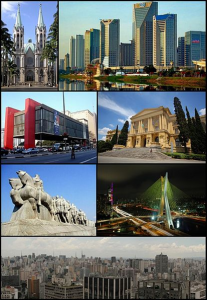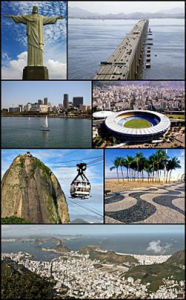Differences between Brazilian Portuguese and Portuguese from Portugal
The differences in the spoken language are much more pronounced than the differences in the formal written language
The Brazilian spellings of certain words differ from those used in Portugal and the other Portuguese-speaking countries. Some of these differences are merely orthographic, but others reflect true differences in pronunciation. They are similar to how the English spellings of certain words in the United States differ from the spellings used in other English-speaking countries.
A few examples are given in the following table:
| Brazil | Portugal | English |
| abridor de latas | abre-latas | can opener |
| aeromoça, comissária de bordo | hospedeira | flight stewardess |
| água-viva, medusa | alforreca | jellyfish |
| AIDS | SIDA (Síndrome da Imunodeficiência Adquirida) | AIDS |
| alho poró | alho-porro, alho-francês | leek |
| amerissagem | amaragem | landing on the sea, splash-down |
| aquarela | aguarela | watercolor |
| arquivo | ficheiro | file |
| aterrissagem | aterragem | landing |
| Band-Aid | penso rápido | band-aid (US), plaster (UK) |
| banheiro, toalete, toilettes, sanitário | casa de banho, quarto de banho, lavabos, sanitários | bathroom, toilet |
| bonde, bonde elétrico | eléctrico | streetcar (US), tram (UK) |
| brócoli | brócolos | broccoli |
| cílio (Classical Latin “cilium”), pestana, celha | pestana | eyelash |
| café da manhã, desjejum, parva | pequeno almoço, desjejum | breakfast |
| caminhonete, van, perua (informal) | camioneta | station wagon (US), estate car (UK) |
| câncer | cancro | cancer (the disease) |
| carona | boleia | ride, hitchhiking |
| carteira de habilitação, carteira de motorista, carta | carta de condução | driver’s license (US), driving licence (UK) |
| carteira de identidade, RG (from “Registro Geral”) | bilhete de identidade | ID card |
| telefone celular (or simply and most common “celular”), aparelho de telefonia celular | telemóvel | cell phone (US), mobile phone (UK) |
| canadense | canadiano | Canadian |
| caqui (from Japanese 柿 kaki) | dióspiro | persimmon |
| disco rígido, HD | disco duro | hard disk |
| dublagem | dobragem | dubbing |
| durex, fita adesiva | fita gomada, fita-cola, fita adesiva | Scotch Tape (US), Sellotape (UK) |
| time, equipe | equipa, equipe | team |
| estação de trem | gare, estação | railway station |
| estrada de ferro, ferrovia | caminho de ferro, ferrovia | railway |
| favela | bairro de lata | slum, shanty-town |
| fila | bicha, fila | line (US), queue (UK) |
| fóton | fotão | photon |
| fones de ouvido | auscultadores, auriculares | headphones |
| freio, breque | travão, freio | brake |
| gol | golo | goal (in sports) |
| grama, relva | relva | grass (lawn) |
| Irã | Irão | Iran |
| Islã | Islão | Islam |
| israelense, israelita | israelita | Israeli |
| maiô, maillot | fato de banho | woman’s swimsuit |
| mamadeira | biberão, biberon | baby bottle |
| metrô | metro, metropolitano | underground railway, metropolitan railway |
| Moscou | Moscovo | Moscow |
| ônibus | autocarro | bus |
| polonês, polaco | polaco | Polish |
| rúgbi, rugby | râguebi, rugby | rugby |
| secretária eletrônica | atendedor de chamadas | (telephone) answering machine |
| sutiã, soutien | soutien, sutiã | bra |
| tcheco, checo | checo | Czech |
| tela | ecrã | screen |
| trem, composição ferroviária | comboio | train |
| Vietnã | Vietname | Vietnam |
Brazil
Is the largest country in South America and in the Latin America region. It is the world’s fifth largest country, both by geographical area and by population with over 193 million people.
Did you know that… the word “Brasil” comes from brasilwood, a tree that once grew plentifully along the Brazilian coast. In Portuguese, brasilwood is called pau-brasil and the capital of Brasil is Brasilia..?!
Brasil has two main cities Sao Paulo and Rio de Janeiro.
SAO PAULO
Sao Paulo Is the largest city in Brasil. The metropolis has significant cultural, economic and political influence both nationally and internationally. It is home to several important monuments, parks and museums such as the Latin America Memorial, the Museum of the Portuguese Language , São Paulo Museum of Art, Museum of Ipiranga and the Ibirapuera Park. Paulista Avenue is the most important financial center of São Paulo. The city holds many high profile events, like the Sao Paulo art Biennial, the Brazil Grand Prix Formula 1 Sao Paulo, Sao Paulo FAshion Week, ATP Brasil Open, and the Sao Paulo Indy 300. Sao Paulo hosts the world’s largest gay pride parade according to the Guinness Book of World Records.
Rio de Janeiro
Rio de Janeiro is the most visited city in the southern hemisphere and is known for its natural settings, carnaval celebrations, samba, Bossa Nova, balneario beaches such as Barra da Tijuca, Copacabana, Ipanema, and Leblon. Some of the most famous landmarks in addition to the beaches include the giant statue of Christ the Redeemer (“Cristo Redentor”) atop Corcovado mountain, named one of the New Seven Wonders of the World; Sugarloaf mountain (Pão de Açúcar) with its cable car; the Sambodromo, a permanent grandstand-lined parade avenue which is used during Carnival; and Maracana Stadium, one of the world’s largest football stadiums.
Brazilian Portuguese is the best language
If you want a decent return on your investment, says Helen Joyce, the best language to learn is Brazilian Portuguese…
Some lunatics learn languages for fun. The rest of us are looking for a decent return on our investment. That means choosing a language with plenty of native speakers. One spoken by people worth talking to, in a place worth visiting. One with close relatives, so you have a head start with your third language. One not so distant from English that you give up.
There really is only one rational choice: Brazilian Portuguese. Brazil is big (190m residents; half a continent). Its economic prospects are bright. São Paulo is Latin America’s business capital. No other country has flora and fauna more varied and beautiful. It is home to the world’s largest standing forest, the Amazon. The weather is great and so are the beaches. The people are friendly, and shameless white liars. You’ll be told “Your Portuguese is wonderful!” many times before it is true.
You won’t need a new alphabet or much new grammar, though you may find the language addicted to declensions and unduly fond of the subjunctive. You’ll learn hundreds of words without effort (azul means blue, verde means green) and be able to guess entire sentences (O sistema bancário é muito forte: the banking system is very strong). With new pronunciation and a few new words you’ll get around in Portugal and parts of Africa. If you speak Spanish, French or Italian, you’ll find half the work is already done — and if not, why not try? With Portuguese under your belt you’ll fly along.
Best of all, you’ll stand out. Only about 10m Brazilians have reasonable English, and far more Anglophones speak French or Spanish than Portuguese, of any flavour. I did not choose this language; it was thrust on me by the offer of a job in São Paulo. But when I think of my sons, now ten and five, one day being able to write “fluent Brazilian Portuguese” on their CVs, I feel a little smug.
Helen Joyce is The Economist’s São Paulo correspondent
Source: http://moreintelligentlife.com/content/ideas/helen-joyce/brazilian-portuguese-best-language





Latest Comments